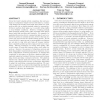Free Online Productivity Tools
i2Speak
i2Symbol
i2OCR
iTex2Img
iWeb2Print
iWeb2Shot
i2Type
iPdf2Split
iPdf2Merge
i2Bopomofo
i2Arabic
i2Style
i2Image
i2PDF
iLatex2Rtf
Sci2ools
SAC
2015
ACM
2015
ACM
Adaptive blurring of sensor data to balance privacy and utility for ubiquitous services
Given the trend towards mobile computing, the next generation of ubiquitous “smart” services will have to continuously analyze surrounding sensor data. More than ever, such services will rely on data potentially related to personal activities to perform their tasks, e.g. to predict urban traffic or local weather conditions. However, revealing personal data inevitably entails privacy risks, especially when data is shared with high precision and frequency. For example, by analyzing the precise electric consumption data, it can be inferred if a person is currently at home, however this can empower new services such as a smart heating system. Access control (forbid or grant access) or anonymization techniques are not able to deal with such trade-off because whether they completely prohibit access to data or lose source traceability. Blurring techniques, by tuning data quality, offer a wide range of trade-offs between privacy and utility for services. However, the amount of ubiquito...
| Added | 17 Apr 2016 |
| Updated | 17 Apr 2016 |
| Type | Journal |
| Year | 2015 |
| Where | SAC |
| Authors | Assaad Moawad, Thomas Hartmann 0001, François Fouquet, Jacques Klein, Yves Le Traon |
Comments (0)

